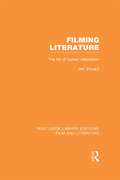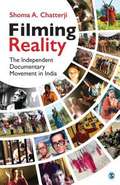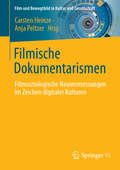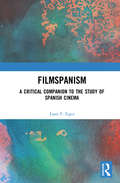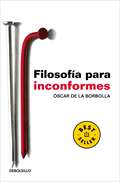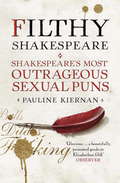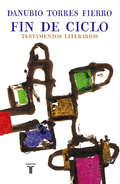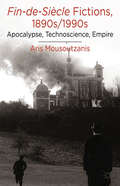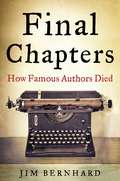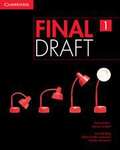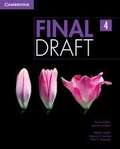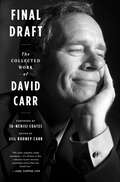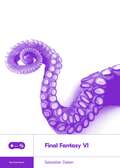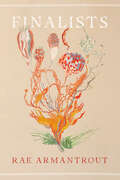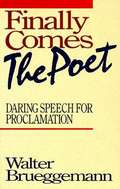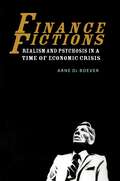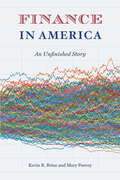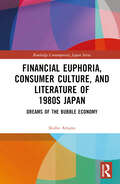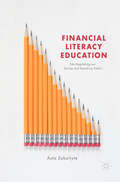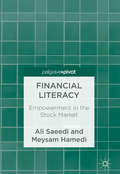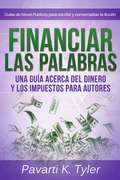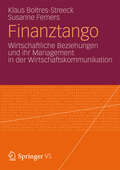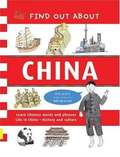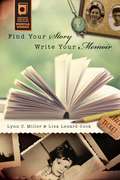- Table View
- List View
Filming Literature: The Art of Screen Adaptation (Routledge Library Editions: Film and Literature)
by Neil SinyardThis is a comprehensive survey of the relationship between film and literature. It looks at the cinematic adaptations of such literary masters as Shakespeare, Henry James, Joseph Conrad and D.H. Lawrence, and considers the contribution to the cinema made by important literary figures as Harold Pinter, James Agree and Graham Greene. Elsewhere, the book draws intriguing analogies between certain literary and film artists, such as Dickens and Chaplin, Ford and Twain, and suggests that such analogies can throw fresh light on the subjects under review. Another chapter considers the film genre of the bio-pic, the numerous cinematic attempts to render in concrete terms the complexities of the literary life, whether the writer be Proust, Joyce, Oscar Wilde, Dashiel Hammett, Agatha Christie or Boris Pasternak. Originally published in 1986, this is a book to appeal to any reader with an interest in film or literature, and is of especial value to those involved in the teaching or study of either subject.
Filming Reality
by Shoma A. ChatterjiAn informative read about the incredible journey of the independent documentary film movement in India. Filming Reality explores the independent documentary film movement in India post-1970s, when it began to acquire an identity of its own and many films got worldwide recognition. It analyses notable documentaries made over the last four decades, including those by iconic film-makers such as Satyajit Ray, Mani Kaul, Anand Patwardhan; activists such as Rakesh Sharma, Ranjan Palit, Amar Kanwar; feminists such as Deepa Dhanraj and Madhusree Dutta; and auteurs such as Sanjay Kak, R.V. Ramani and others. Featuring a compilation and analysis of noted and rare documentaries, this book is of immense value to film buffs, film scholars and film-makers.
Filmische Dokumentarismen: Filmsoziologische Neuvermessungen im Zeichen digitaler Kulturen (Film und Bewegtbild in Kultur und Gesellschaft)
by Carsten Heinze Anja PeltzerDas Buch bietet filmsoziologische (Neu-)Vermessungen aktueller Konfigurationen des Dokumentarischen unter digitalen Bedingungen. Den empirischen Ausgangspunkt bilden die Ausdifferenzierungen und Veränderungen dokumentarischer Praktiken, die sich in ganz unterschiedlichen filmischen Genres beobachten lassen, von True Crime Formaten, Livestreaming-Rollenspielen, Extremsportvideos über das Quality TV bis hin zum klassischen Dokumentarfilm. Daraus erwachsen im Horizont filmsoziologischer Forschungsfelder ganz neue Herausforderungen, die die Bestimmung des Gegenstands wesentlich betreffen. Denn im Zuge dieser Veränderungen werden grundlegende Fragen zum Zusammenhang von filmischer und sozialer Wirklichkeit, Dokumentation und Fiktion, Realität und Irrealität, Wahrheit und Unwahrheit neu gestellt und müssen beantwortet werden. Der vorliegende Band führt in einer konzeptionellen Einleitung den Begriff ‚filmischer Medien‘ ein sowie in die Besonderheiten ihres Verhältnisses zur sozialen Wirklichkeit. Daran anschließend gehen die einzelnen Beiträge den filmischen Transitionen des Dokumentarischen unter digitalen Bedingungen an signifikanten Fällen nach und untersuchen u.a. folgenden Fragestellungen: Zeichnen sich filmische Verfahren der Wahrheit, Aufrichtigkeit, Objektivität oder Echtheit in den Produkten ab? In welchem Verhältnis stehen diese Verfahren sowohl zu den tradierten filmischen Formen des Spiel- und Dokumentarfilms als auch zu den digitalen Logiken der Plattformen? Wie verhält sich das Prinzip der Liveness auf den Plattformmedien zur rekonstruktiven Logik des Dokumentarischen? Und schließlich: Was zeigt die Ubiquität des Filmischen – als Beweis, als Geständnis, als Fälschung, als Unterhaltung, als Artefakt, als Epos oder als Zufall – über die kommunikativen Routinen einer Gesellschaft an? Der Band richtet sich an Medien- und Filmsoziolog*innen, Medien- und Filmwissenschaftler*innen sowie Kulturwissenschaftler*innen. Die Herausgeber PD Dr. Carsten Heinze ist wissenschaftlicher Mitarbeiter für die Lehre an der Fakultät für Wirtschafts- und Sozialwissenschaften an der Universität Hamburg und Mitherausgeber der Reihe "Film und Bewegtbild in Kultur und Gesellschaft". Seine Forschungsschwerpunkte sind Film- und Mediensoziologie, insbesondere dokumentarischer Film, Jugendsoziologie, Jugendkulturen und populäre Musik. Dr. Anja Peltzer habilitiert an der Universität Mannheim mit einer Arbeit zur relationalen Filmsoziologie. Zuvor hat sie an den Universitäten Freiburg, Trier und Mannheim gelehrt und geforscht. Ihre Forschungsschwerpunkte lauten: Film- und Mediensoziologie, Politik und Ästhetik digitaler Kommunikation, Krieg, Rezeptionsforschung und Methoden qualitativer Sozialforschung.
Filmspanism: A Critical Companion to the Study of Spanish Cinema
by Juan F. EgeaFilmspanism explores the geopolitics of knowledge involved in academic approaches to Spanish cinema. This companion rethinks the role of disciplinarity, institutionality, and nationality in the study of film by taking into account a rather specific set of contentious issues, intellectual traditions, discursive servitudes, and invested scholarship. To that end, the book explores the topics of art cinema, popular culture, film genre, and transnationalism, always with Spanish cinema as its concrete object of study. An insightful contribution to the study of Spanish cinema, this discussion will be of interest to researchers and graduate students in Hispanic Studies and Film Studies.
Filosofía para inconformes
by Óscar de la BorbollaUn gran libro de Filosofía, apto para todo público interesado en expandir su conocimiento sobre el pensamiento moderno. En otros tiempos este libro habría sido quemado. Filosofía para inconformes es un libro rebelde, escrito con humor y corrosiva amenidad donde las ideas fluyen en forma de ensayo, fábula, monólogo, aforismo, diatriba, manifiesto... hasta formar un mosaico multigenérico donde el lector podrá reírse de todo y, principalmente, de sí mismo. No se trata de un pensamiento amargo que desemboque en la tristeza y la abulia, sino de un desencanto festivo que hace del pensamiento un carnaval. En esta obra, Óscar de la Borbolla -pensador agudo y amargo- reflexiona con implacable humor negro a propósito del sentido de la vida y la muerte; de la locura y la demagogia; de la corrupción política, del amor y, en general, de los asuntos que han preocupado siempre a los filósofos, y que hoy resulta indispensable abordar sin complacencias. Filosofía para inconformes propone un entramado de conceptos que dan expresión a la inconformidad actual.
Filthy Shakespeare: Shakespeare's Most Outrageous Sexual Puns
by Pauline KiernanThe works of William Shakespeare contain at least 400 puns on male and female genitals. Despite the richness and breathtaking scope of his sexual language, too little attention has been paid to the sheer salacious inventiveness of his indecent puns - until now. His plays and poems pulsate with puns on body parts and what they do. Filthy Shakespeare presents over 70 sizzling examples of the Bard at his raciest, arranged under different categories from Balls to Buggery, from Cunnilingus to the Clap, from Homosexual to Transvestite. Each filthy Shakespearean passage is translated into modern English and the hidden sexual meanings of the words explained in a glossary. In her fascinating and lively Introduction, Pauline Kiernan shows how Shakespeare's sexual wordplay had its roots in the social and political reality of Elizabethan and Jacobean England, where the harsh facts of life were often disguised by bawdy, brutal punning, and in the era when the English secret service was born, deciphering secret codes became a national obsession.
Fin de ciclo: Testamentos literarios
by Danubio Torres FierroEl siglo XXI se ha mostrado como un momento del desarrollo histórico recortado por bruscas y sorprendentes transiciones, alimentado por cambios innovadores y por modificaciones veloces que aspiran a desestabilizar o a aniquilar lo que por mucho tiempo permaneció inalterable y munido de una supuesta vocación de permanencia. Por supuesto, la literatura, y sobre todo la escritura de la literatura, no están a salvo de este maremágnum. Danubio Torres Fierro reúne en este libro una selección de sus escritos más significativos y entrañables, luego de una vida dedicada a la crítica literaria y actividades afines a ella. En esta constelación de obras, personas y personajes, anécdotas y remembranzas, que se inscriben y se delinean en el circuito de ideas que caracterizaron a una época floreciente de las letras, el autor desgrana una forma singular de entender el quehacer literario y de animar el trayecto de la propia vida que hoy parecen llamados a disolverse en el olvido, sometidos por un lado al imperativo de cambio que proponen los nuevos paradigmas artísticos y por otro al duelo creciente por el paso del tiempo y las amistades y las figuras que se ausentan. Se asiste, así, a una doble y complementaria cancelación: un ciclo literario, y cultural, que se acaba y un ciclo personal, y comunitario, que se cierra. Este legado literario, compuesto de ensayos, crónicas, críticas y semblanzas de autores de todo el universo mundo (de Choderlos de Laclos a Constantino Cavafis y Francois Furet, de Lionel Trilling a Cyril Connoly y George Steiner, de Silvina Ocampo a Ida Vitale y Elizabeth Bishop, de Luis Cernuda a Josep Pla y Jaime Gil de Biedma, de Machado de Assis a Tarsila do Amaral y Clarice Lispector, de Octavio Paz a Guillermo Cabrera Infante y Julio Cortázar, de Juan Carlos Onetti a Mario Vargas Llosa y Juan Goytisolo, entre muchos otros: el elenco dibuja aquí los contornos de un mapamundi en el que América Latina y España son hermanados dominios protagónicos) debe entenderse como un ejercicio escritural en el que coinciden una lectura crítica y una memoria personal, una y otra nutridas de sano discernimiento interpretativo y de nostálgica memoria íntima para al cabo tocar un centro de dimensiones plurales y una geografía de alcances colectivos: el universo del que el autor fue testigo entre las postrimerías del siglo pasado y los albores de este que comienza. Son estas páginas el testimonio ejemplar y casi póstumo de un representante pertinaz de un oficio crítico responsable que abreva por igual en las fuentes del periodismo circunstancial y la especialización cultural y que, sometido a las sacudidas de la revolución digital en curso, ya no volverá a ser el mismo.
Fin-de-Siècle Fictions, 1890s-1990s: Apocalypse, Technoscience, Empire
by A. MousoutzanisFin-de-Siècle Fictions, 1890s- 1990s focuses on fin-de-siècle British and postmodern American fictions of apocalypse and investigates the ways in which these narratives demonstrate shifts in the relations among modern discourses of power and knowledge.
Final Chapters: How Famous Authors Died
by Jim Bernhard"Everybody has got to die, but I have always believed an exception would be made in my case.” -William Saroyan, Pulitzer Prize-winning authorFamous authors, like everybody else, know that one day they will die. Final Chapters tells the fascinating stories of more than one hundred writers’ encounters with death-and their attitudes toward the Grim Reaper: fear, uncertainty, or acceptance.Francis Bacon wrote, "It is as natural to die as to be born,” while Socrates told the judges who condemned him, "And now we go our ways, I to die and you to live. Which is better is known to God alone.”Death often came in startling ways for these well-known writers. The playwright Aeschylus was conked by a turtle falling from the sky. Christopher Marlowe was stabbed in a barroom brawl. Molière collapsed while playing the role of a hypochondriac in one of his plays.Edgar Allan Poe was found semicomatose in someone else’s clothes shortly before he died. Sherwood Anderson was felled by a toothpick in a martini. Did Dylan Thomas really die of eighteen straight whiskeys? And was it a bottle cap or murder that did in Tennessee Williams?If these authors have lessons for us, the best may be that of Marcus Aurelius: "Death smiles at us all; all we can do is smile back.”
Final Draft 1
by Pamela Hartmann Robyn Brinks Lockwood David Bohlke Wendy AsplinAcademic writing is difficult, and Final Draft gives students all the tools they need. Writing skills and in-depth analysis of models set the stage for development. Corpus-based vocabulary, collocations, and phrases, as well as detailed information on the grammar of writing, prepare your learners for college writing courses. Students learn to avoid plagiarism in every chapter of every level. This dedicated, long-term focus on plagiarism avoidance helps ensure that these students are able to use sources and highlight their own thoughts.
Final Draft 4
by Wendy Asplin Monica F. Jacobe Alan S. Kennedy Lindsay HansenAcademic writing is difficult, and Final Draft gives students all the tools they need. Writing skills and in-depth analysis of models set the stage for development. Corpus-based vocabulary, collocations, and phrases, as well as detailed information on the grammar of writing, prepare your learners for college writing courses. Students learn to avoid plagiarism in every chapter of every level. This dedicated, long-term focus on plagiarism avoidance helps ensure that these students are able to use sources and highlight their own thoughts.
Final Draft: The Collected Work of David Carr
by David Carr“A revelatory collection reminding us of what journalism used to be—and what it ought to be.” —Kirkus Reviews (starred review)Throughout his twenty-five-year career, David Carr was noted for his sharp and fearless observations, his uncanny sense of fairness and justice, and his remarkable compassion and wit. His writing was informed both by his own hardships as an addict and his intense love of the journalist’s craft. His range—from media politics to national politics, from rock ‘n’ roll celebrities to the unknown civil servants who make our daily lives function—was broad and often timeless. Edited by his widow, Jill Rooney Carr, and with an introduction by one of the many journalists David Carr mentored, Ta-Nehisi Coates, Final Draft is a career-spanning selection of the legendary reporter’s writing for the New York Times, Washington City Paper, New York Magazine, the Atlantic, and more.“Wit, style, empathy, tough questions—it’s all here, in this collection by the one-man journalism school that was David Carr . . . Final Draft allows us to read decades of David’s best reportage about corruption, racism, celebrity, addiction, disease, and his love for his family, his skills only outdone by his humanity.” —Jake Tapper, CNN Chief Washington Correspondent
Final Fantasy V (Boss Fight Books)
by Chris KohlerWhen Final Fantasy V was released for the Japanese Super Famicom in 1992, the fantasy role-playing game was an instant hit, selling two million copies in the first two months alone. But the game was dubbed too hardcore for a Western audience and was not released outside Japan. That didn't stop a teenage Chris Kohler from tracking down Final Fantasy V. The young RPG fan got a Japanese copy of the game, used it to teach himself Japanese, and with the help of some internet companions created the first-ever comprehensive English-language FAQ of the game. Now the acclaimed author of Power-Up and an editor at Kotaku, Kohler is revisiting the game that started his career in games journalism. Based on new, original interviews with Final Fantasy V's director, Hironobu Sakaguchi, as well as previously untranslated interviews with the rest of the development team, Kohler's book weaves history and criticism to examine one of the Final Fantasy series's greatest and most overlooked titles.
Final Fantasy VI (Boss Fight Books)
by Sebastian DekenTerra the magical half-human. Shadow the mysterious assassin. Celes the tough, tender general. Kefka the fool who would be god. Each of the many unforgettable characters in Final Fantasy VI has made a huge impression on a generation of players, but why do we feel such affection for these 16-bit heroes and villains as so many others fade? The credit goes to the game&’s score, composed by the legendary Nobuo Uematsu. Armed with newly translated interviews and an expert ear for sound, writer and musician Sebastian Deken conducts a critical analysis of the musical structures of FF6, the game that pushed the Super Nintendo&’s sound capabilities to their absolute limits and launched Uematsu&’s reputation as the &“Beethoven of video game music.&” Deken ventures deep into the game&’s lush soundscape—from its expertly crafted leitmotifs to its unforgettable opera sequence—exploring the soundtrack&’s lasting influence and how it helped clear space for game music on classical stages around the world.
Finalists (Wesleyan Poetry Ser.)
by Rae ArmantroutA double book by Pulitzer Prize winning poet Rae Armantrout What will we call the last generation before the looming end times? With Finalists Rae Armantrout suggests one option. Brilliant and irascible, playful and intense, Armantrout nails the current moment's debris fields and super computers, its sizzling malaise and confusion, with an exemplary immensity of heart and a boundless capacity for humor. The poems in this book find (and create) beauty in midst of the ongoing crisis. CONTRAST What's to like if not contrast? Shadows beneath the model's sharp cheekbones, her ample yet precise lips. Clean lines separating bounty from its opposite. This is not what I want to want. These eyes on the hypothetical distance.
Finally Comes the Poet: Daring Speech for Proclamation
by Walter BrueggemannFour lectures on preaching as a subversive activity, in which scripture, preacher and community are brought together to "voice a new world".
Finance Fictions: Realism and Psychosis in a Time of Economic Crisis
by Arne De BoeverFinance Fictions takes the measure of what it means to live in a world ruled by high finance by examining the tension between psychosis and realism that plays out in the contemporary finance novel. When the things traded at the center of the economy cease to be things at all, but highly abstracted speculations, how do we come to see the real? What sorts of narrative can accurately approach the actual workings of a neoliberal economy marked by accelerating cycles of market crashes, economic and political crisis, and austerity?Revisiting such twentieth-century classics of the genre as Tom Wolfe's Bonfire of the Vanities and Bret Easton Ellis’s American Psycho, De Boever argues that the twenty-first century is witnessing the birth of a new kind of realistic novel that can make sense of complex financial instruments like collateralized debt obligations, credit default swaps, and digital algorithms operating at speeds faster than what human beings or computers can record. If in 1989 Wolfe could still urge novelists to work harder to “tame the billion-footed beast of reality,” today’s economic reality confronts us with a difference that is qualitative rather than quantitative: a new financial ontology requiring new modes of thinking and writing.Mobilizing the philosophical thought of Quentin Meillassoux in the close reading of finance novels by Robert Harris, Michel Houellebecq, Ben Lerner and less well-known works of conceptual writing such as Mathew Timmons’ Credit, Finance Fictions argues that realism is in for a speculative update if it wants to take on the contemporary economy—an “if” whose implications turn out to be deeply political. Part literary study and part philosophical inquiry, Finance Fictions seeks to contribute to a new mindset for creative and critical work on finance in the twenty-first century.
Finance in America: An Unfinished Story
by Kevin R. Brine Mary PooveyThe economic crisis of 2008 led to an unprecedented focus on the world of high finance—and revealed it to be far more arcane and influential than most people could ever have imagined. Any hope of avoiding future crises, it’s clear, rest on understanding finance itself. To understand finance, however, we have to learn its history, and this book fills that need. Kevin R. Brine, an industry veteran, and Mary Poovey, an acclaimed historian, show that finance as we know it today emerged gradually in the late nineteenth century and only coalesced after World War II, becoming ever more complicated—and ever more central to the American economy. The authors explain the models, regulations, and institutions at the heart of modern finance and uncover the complex and sometimes surprising origins of its critical features, such as corporate accounting standards, the Federal Reserve System, risk management practices, and American Keynesian and New Classic monetary economics. This book sees finance through its highs and lows, from pre-Depression to post-Recession, exploring the myriad ways in which the practices of finance and the realities of the economy influenced one another through the years. A masterwork of collaboration, Finance in America lays bare the theories and practices that constitute finance, opening up the discussion of its role and risks to a broad range of scholars and citizens.
Financial Euphoria, Consumer Culture, and Literature of 1980s Japan: Dreams of the Bubble Economy (Routledge Contemporary Japan Series)
by Ikuho AmanoThis book is an interdisciplinary study of Japan during the socially euphoric years of the Bubble Economy in the 1980s. Shedding light on consumer experiences, this study explores the socio-cultural landscape of Japan, the nation that boasted the second largest economy in the late twentieth century. Drawing its analysis from various media sources, popular literary works, and public reports, the book articulates how the late 1980s calibrated consumer demands, lifestyles, and perceptions of wealth. Through an examination of the qualitative effects of ‘Bubble money’ on consumers, the book disentangles the anatomy of the festive ambience in the economic phase, closely reading fictional and non-fictional literary works that play the role of reportage, critique, and satire. Through observations of human behaviours in consumption, the book reveals psychosomatic experiences and self-consciousness. Featuring a wide range of sources from Japanese media and literary works which have yet to be translated for an English audience, this book will be a valuable resource for students and scholars of modern Japanese culture and literature who are interested in the socio-economic landscape of late-twentieth-century Japan.
Financial Literacy Education
by Asta ZokaityteThis book explores the issue of consumer financial education, responding to increased interest in, and calls to improve peoples' financial literacy skills and abilities to understand and manage their money. New conceptual frameworks introduced in the book offer academic audiences an innovative way of thinking about the project on financial literacy education. Using the concepts of 'edu-regulation' and 'financial knowledge democratisation' to analyse the financial education project in the UK, the book exposes serious, and often ignored, limitations to using information and education as tools for consumer protection. It challenges the mainstream representation of financial literacy education as a viable solution to consumer financial exclusion and poverty. Instead, it argues that the project on financial literacy education fails to acknowledge important dependences between consumer financial behaviour and the socio-economic, political, and cultural context within which consumers live. Finally, it reveals how these international and national calls for ever greater financial education oversimplify and underestimate the complexity of consumer financial decision-making in our modern times.
Financial Literacy: Empowerment In The Stock Market
by Ali Saeedi Meysam HamediThis book provides an overview of current issues associated to financial literacy improvement. In selecting and structuring the material to include, the primary criterion has been applicability of topics and recommendations and accuracy of trends toward better financial literacy level. Each chapter is dedicated to a particular component of financial literacy from education to capability.Throughout the book, there are many practices initiated around the world which, regardless of their superiority, are all useful initiatives and can roll play as a spot light in the road of improvement for both investors and authorities. This book is not only applicable for academics and students, but authorities who aim to improve financial literacy (and subsequently financial capability) among individuals and for those investors who seek to improve their own financial literacy.
Financiar las palabras: Una guía acerca del dinero y los impuestos para autores
by Alma Edith Garcia Pavarti K. TylerOrganizar tus finanzas personales significa ganar más dinero y ¿quién no quiere ganar más dinero? Los escritores tienden a ser personas con facilidad para las palabras, ¡lo que significa que la temporada de pago de impuestos puede causarles mucha angustia! ¿Has estado tomando todas las medidas necesarias para asegurarte de que puedas maximizar tu devolución? ¿Estás guardando todos tus recibos en una caja de zapatos? ¿Tienes pesadillas llenas de signos de dólares flotando en el aire y mientras te preocupas por todo el dinero que vas a deber después de que por fin termines de declarar impuestos? ¡ Financiar las palabras está aquí para ayudarte! Prepárate para aprender todo lo que jamás hayas necesitado aprender sobre operar tu propio negocio y declarar impuestos como autor y a dedicar tan sólo unas horas a preparar tus registros. Con Pavarti K. Tyler como tu guía, harás un recorrido por los números, aprenderás cuáles gastos son deducibles y cuáles no, te enterarás de trucos para preparar tu empresa como autor y recibirás recomendaciones innovadoras para aplicar tu talento y agregar un poco más de grosor a tu alcancía. Con este guía, recibirás explicaciones prácticas y fáciles de entender acerca de cómo organizar y como administrar tus finanzas, incluyendo: Cómo ser un emprendedor exitoso La regla de impuestos #1 que tienes que saber Ganar dinero y qué hacer con él Los pros y contras de establecer una sociedad Los pagos a diseñadores, editores y otros contratistas Preguntas frecuentes Maximizar tus deducciones Determinar cuáles son tus bienes o activos Ganar dinero por gastar dinero Contratar a un profesional de impuestos o presentar tu declaración tú mismo ¡También ofrecemos nueve regalos exclusivos para los lectores de este libro! Nuestra garantía: ¿Estás cansado de examinar meticulosamente las guías de marketing que se centran más en la experienc
Finanztango
by Klaus Boltres-Streeck Susanne FemersWirtschaftskommunikation ist eine vielfältige Managementaufgabe. Gegenstände der Steuerung sind zweifelsohne die Inhalte und Instrumente der Kommunikation. Management in der Wirtschaftskommunikation bedeutet aber mehr: Vielfältige Beziehungen der Akteure im Kommunikationsprozess sind von Kommunikationsmanagern aktiv und bewusst zu gestalten. Im "Finanztango" dieser Wirtschaftsbeziehungen sind daher für zielorientierte Kommunikation die Parkettbeschaffenheit zu prüfen, die gemeinsamen Schrittfolgen genau zu planen und mögliche Hindernisse abzuschätzen. Dieses Buch bündelt und systematisiert Wissen zum Beziehungsmanagement, damit die Pflicht nicht zur Bürde und die Kür ohne Abzug in der B-Note absolviert wird .
Find Out About China: Learn Chinese Words And Phrases And About Life In China (Find Out About Books)
by Zheng Qing Tim HutchinsonEach Find Out About book introduces boys and girls to a different country, its people, its history, its culture, and its language. The books are divided into four parts:
Find Your Story, Write Your Memoir
by Lynn C. Miller Lisa Lenard-CookEvery person has a story to tell, but few beginners know how to uncover their story's narrative potential. And despite a growing interest among students and creative writers, few guides to the genre of memoirs and creative nonfiction highlight compelling storytelling strategies. Addressing this gap, authors Lynn C. Miller and Lisa Lenard-Cook provide a compact, accessible guide to memoir writing that shows how an aspiring memoir writer can use storytelling tools and tactics borrowed from fiction to weave personal experiences into the shape of a story. Find Your Story, Write Your Memoiroffers an overview of the building blocks of memoir writing. Individual chapters focus on key issues and challenges, such as the balance between the remembering narrator and the experiencing narrator, the capacity to honor the subjective voice, the occasion of telling (why does this narrator tell this storynow?), creating an organically functional structure for a particular story, and taking the next steps with a written memoir. Drawing on their combined years of experience teaching memoir writing, authoring works of fiction and nonfiction, and working in autobiographical performance, Miller and Lenard-Cook provide a practical guide whose core philosophy is motivated by a key word:story.
